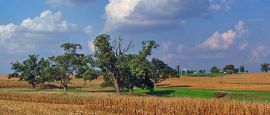Illinois History, Language and Culture
History of Illinois
Illinois takes its name from Illiniwek Confederation, an alliance of several Native American tribes, who resided in Illinois around the 16th and 17th centuries. It wasn’t until the late 17th century that the state was discovered by Europeans, when in 1673 French explorers Jaccques Marquette and Louis Jolliet led an expedition along the Mississippi and Illinois rivers. As a result the area remained under French rule until 1763, when it was passed to the British after the French and Indian War. Illinois then became part of the United States when it acquired the Northwest Territory in 1783.
In 1779 the United Illinois and Wabash Land Company was formed to purchase land from the Native American population still residing in the state. Both British and American officials however, refused to recognise the land purchases, disputing their legality, and the company later folded, leaving the newly formed national government to buy land from the Native American population in the early 19th century.
In 1818, Illinois became the 21st state admitted to the US, and the remaining Native Americans living in the area were forced out as settlement began in the southern portion of the state. This era also saw the opening of the Erie Canal in 1825, which provided an easy route to the Midwest, and a huge influx of people from the east rushing to the newly booming port and railway hub of Chicago.
In the mid-19th century, Illinois came to the forefront of national attention as Abraham Lincoln battled Stephen Douglas for a seat in the US Senate and lost; two years later, the pair fought again for the presidency, and this time Lincoln, an Illinois native, was victorious. That same year, 1861, six states seceded from the Union and formed the Confederacy, and the Civil War began.
After the war, industry in Illinois, and especially Chicago, began booming. Manufacturing and meatpacking took over the city, and Chicago became a massive hub not only for the state, but the country. Illinois was devastated by the Great Chicago Fire in 1871 that burnt an area of around 9 sq km (3.3 sq miles) down to the ground but the state proved resilient and the early 1900s saw many changes in Illinois, with positive reforms benefiting workers and women - the state became a production hub for aircrafts and ammunition during WWII.
Today, Illinois is a hub of activity for the entire US Midwest. Chicago is the third most populous city in the country, and is a retail, industrial, and manufacturing hub that has supported the state economy for decades. The state’s most recent claim to fame is as home to 44th US President Barack Obama, who attended the University of Chicago and was the senator of the state from 1997 to 2008 before taking office.




 You know where
You know where